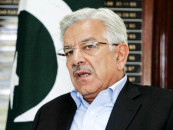On the topic of POL prices
Even today, the government is charging sales tax on high speed diesel at the rate of 28 per cent

The consumers of motor spirit, known as petrol, who at one point in time paid as high a price as Rs120 a litre, have now been denied the full benefits of reduction in its prices. The government’s argument is that it cannot take a hit on its revenues by fully passing on the benefits to end consumers. The argument is tantamount to an admission of failure, as growing reliance on indirect taxes show that the government is incapable of increasing collection of direct taxes. Currently, indirect collection is roughly 62 per cent of the total tax collection and if we add withholding taxes, the indirect collection amounts to roughly 85 per cent.
In the last fiscal year 2015-16, the government collected a whopping Rs526.7 billion on account of various taxes on POL products. In terms of quantity, the POL products imports grew 5.5 per cent; still many times lower than the growth the government achieved in revenue collection. The government achieved this growth rate not because of its own efforts but because of double-taxation policy, as it is collecting sales tax by including all the duties and levies into the prices, which is unjustifiable action.
Even today, the government is charging sales tax on high speed diesel at the rate of 28 per cent of ad valorem – by building all other taxes into the price of the diesel for taxation purposes. The standard sales tax rate is 17 per cent. The high-speed diesel is consumed in public transport and as an input in the agriculture sector. There is a need to bring down the prices of the high-speed diesel by charging the standard 17% sales tax that too not on the basis of the ad valorem. The 17 per cent sales tax should be charged on the actual price of the diesel by excluding customs duties and other charges. The high-speed diesel consumption is over two-thirds of the total petroleum products consumption, therefore, it is subject to high tax rates.
The sales tax rate on motor spirit is 17 per cent of the ad valorem, which should also be adjusted by excluding duties from the price for sales tax calculation purposes.
Published in The Express Tribune, August 27th, 2016.



















COMMENTS
Comments are moderated and generally will be posted if they are on-topic and not abusive.
For more information, please see our Comments FAQ